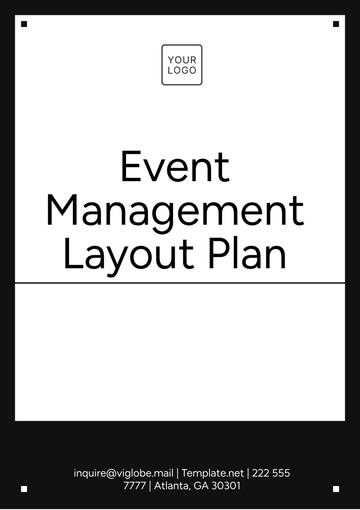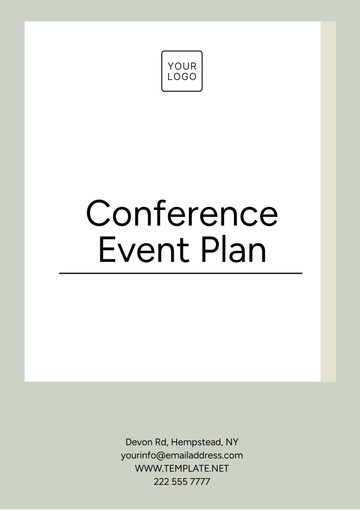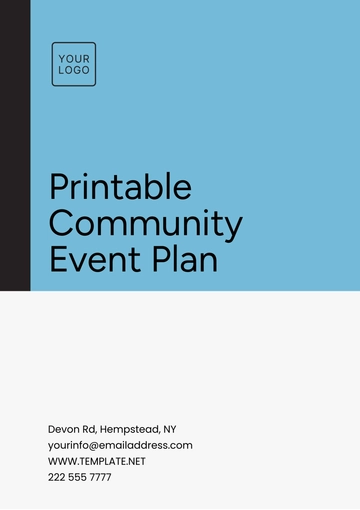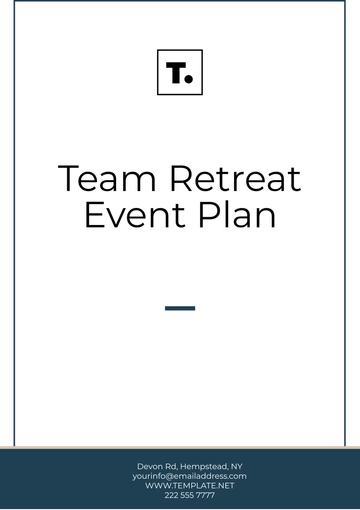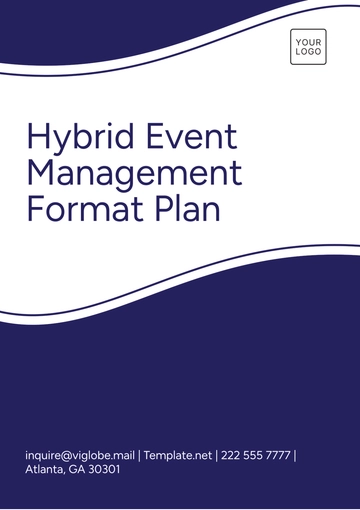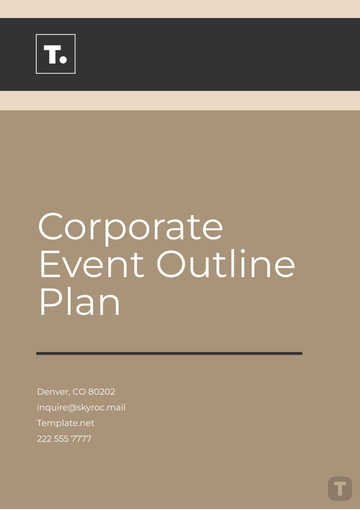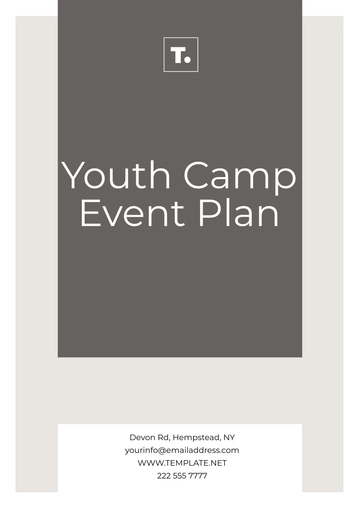Free Charity Event Engagement Outline Plan
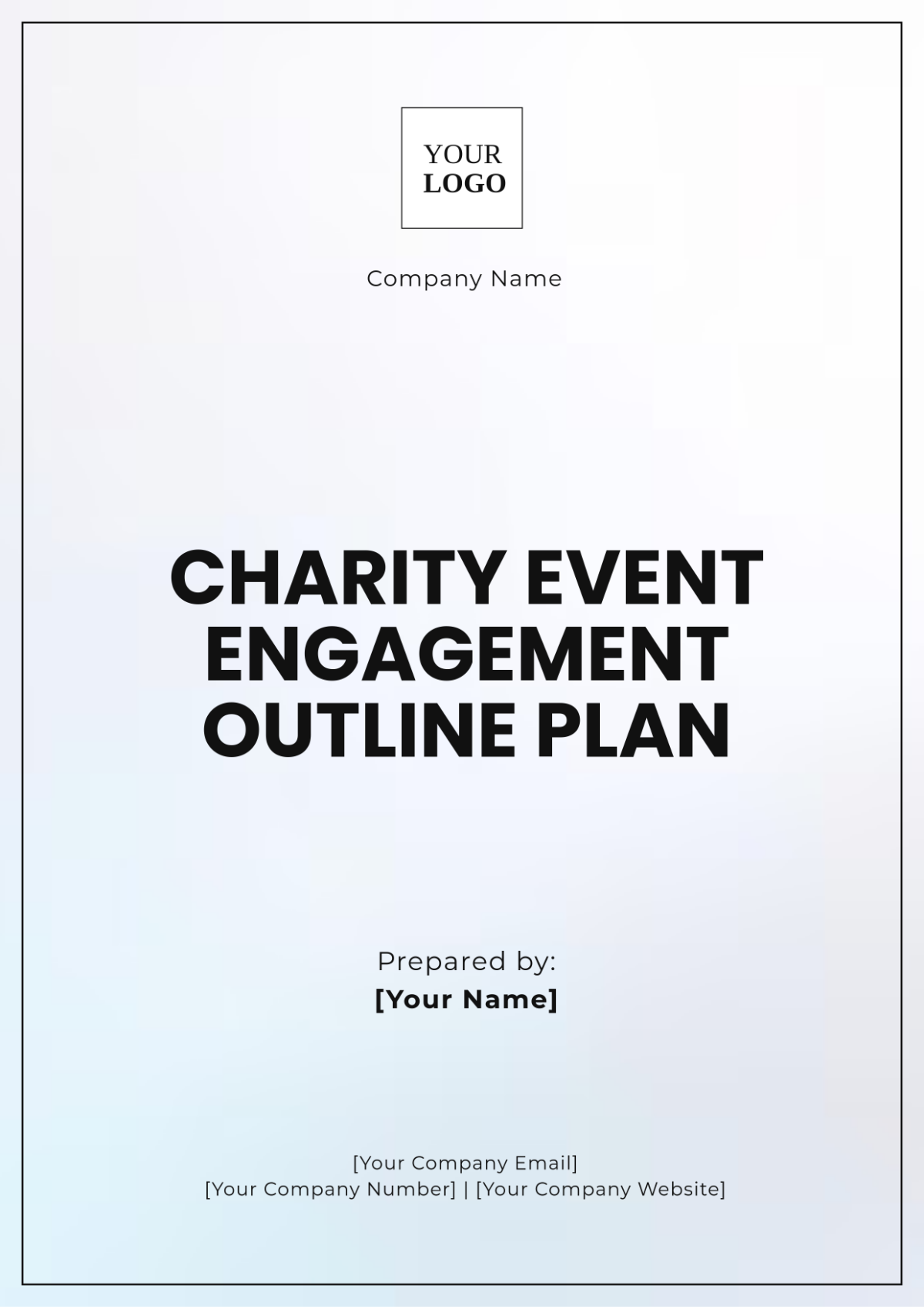
Prepared By: [Your Name]
Organization: [Your Company Name]
1. Introduction
Hosting a charity event involves meticulous planning and structured execution to maximize both impact and engagement. This outline provides a comprehensive framework to ensure success, addressing key aspects from objective setting to post-event follow-up. By following this guide, organizers can create a memorable event that resonates with attendees and supports the charity's mission.
2. Objectives and Goals
Clearly defining objectives is crucial for directing efforts and measuring success.
A. Define the Purpose
Raise Awareness About the Cause: Develop messaging that highlights the importance of the cause. Utilize storytelling techniques to connect with the audience emotionally.
Generate Funds: Set clear financial targets to support ongoing projects. Consider introducing tiered donation options to encourage higher contributions.
Build Community Engagement: Foster connections among community members through interactive activities and networking opportunities. Highlight the impact of community involvement in the charity's mission.
B. Set Measurable Goals
Fundraising Targets: Establish specific financial goals, such as raising $30,000.
Attendance Numbers: Set a target for the number of attendees, e.g., 300 participants, and develop strategies to achieve this through outreach.
Media Coverage Expected: Aim for a certain number of press articles or social media mentions. Create a press kit to facilitate media engagement.
3. Planning and Organization
Structured planning ensures all logistical aspects are covered before the event.
A. Form a Planning Committee
Select Key Members with Relevant Skills: Choose individuals with expertise in fundraising, event planning, marketing, and community outreach to diversify perspectives.
Define Roles and Responsibilities: Clearly outline tasks for each committee member to avoid confusion and overlap. Consider using project management tools to track progress.
B. Budget and Fund Allocation
A detailed budget is vital for financial management and accountability.
Category | Estimated Cost |
|---|---|
Venue | $1,000 |
Catering | $750 |
Marketing | $500 |
Entertainment | $500 |
Decorations | $300 |
Miscellaneous | $200 |
Total | $3,250 |
Contingency Fund: Allocate an additional 10-15% of the total budget for unexpected expenses.
4. Marketing and Promotion
Effective marketing strategies are key for attracting attendees and sponsors.
A. Develop a Marketing Plan
Identify Target Audience: Understand the demographics and interests of potential attendees. Use surveys or focus groups to gather insights.
Choose Appropriate Channels: Utilize social media, email, and print media. Consider creating an event website or a dedicated social media page for updates.
B. Leverage Partnerships
Collaborate with Local Businesses and Influencers: Seek sponsorships or in-kind donations to enhance the event. Create sponsorship packages that outline benefits.
Engage Media for Coverage: Contact local newspapers, radio, and TV stations to promote the event. Offer exclusive interviews or behind-the-scenes access to entice media coverage.
5. Event Execution
A detailed on-the-day schedule ensures smooth operations and maximizes attendee experience.
A. On-the-Day Schedule
Setup and Decoration (2 hours prior): Ensure all areas are arranged and decorated according to plan. Assign a team to handle logistics on-site.
Guest Registration and Welcome (30 mins prior): Check guests in, provide name tags, and distribute event programs. Consider using a digital registration system to streamline the process.
Main Event (3 hours): Execute the program as planned, including speeches, performances, and activities. Ensure a clear timeline for each segment.
Closure and Acknowledgements (30 mins): Thank attendees, sponsors, and volunteers; provide information on how to stay engaged with the charity.
B. Volunteer Coordination
Assign Specific Duties: Designate roles for registration, setup, and assistance during the event. Ensure volunteers know their responsibilities.
Conduct Pre-Event Briefing: Ensure all volunteers understand their roles and the event schedule. Consider hosting a training session to prepare them for interactions with guests.
6. Follow-Up and Evaluation
Post-event activities are vital for maintaining momentum and improving future events.
A. Communicate with Attendees
Send Thank-You Messages: Express gratitude to all attendees, sponsors, and volunteers. Personalize messages to enhance relationships.
Share Event Highlights and Outcomes: Provide a summary of funds raised and community impact achieved through social media or newsletters. Consider creating a visual recap, such as a video montage.
B. Evaluate the Event's Success
Conduct Feedback Surveys: Gather opinions from attendees and volunteers to assess their experiences. Utilize online tools for easy distribution and analysis.
Analyze Financial and Engagement Metrics: Review financial performance against goals, attendance statistics, and engagement levels. Consider holding a debriefing meeting with the planning committee to discuss lessons learned and suggestions for future events.
- 100% Customizable, free editor
- Access 1 Million+ Templates, photo’s & graphics
- Download or share as a template
- Click and replace photos, graphics, text, backgrounds
- Resize, crop, AI write & more
- Access advanced editor
Drive your charity event's success with the Charity Event Engagement Outline Plan Template from Template.net. This editable and customizable template provides a comprehensive framework for planning impactful engagement strategies. Easily adjust the details using our AI Editor Tool to align with your event goals, ensuring a memorable experience that fosters generosity and community involvement. Start planning today!
You may also like
- Finance Plan
- Construction Plan
- Sales Plan
- Development Plan
- Career Plan
- Budget Plan
- HR Plan
- Education Plan
- Transition Plan
- Work Plan
- Training Plan
- Communication Plan
- Operation Plan
- Health And Safety Plan
- Strategy Plan
- Professional Development Plan
- Advertising Plan
- Risk Management Plan
- Restaurant Plan
- School Plan
- Nursing Home Patient Care Plan
- Nursing Care Plan
- Plan Event
- Startup Plan
- Social Media Plan
- Staffing Plan
- Annual Plan
- Content Plan
- Payment Plan
- Implementation Plan
- Hotel Plan
- Workout Plan
- Accounting Plan
- Campaign Plan
- Essay Plan
- 30 60 90 Day Plan
- Research Plan
- Recruitment Plan
- 90 Day Plan
- Quarterly Plan
- Emergency Plan
- 5 Year Plan
- Gym Plan
- Personal Plan
- IT and Software Plan
- Treatment Plan
- Real Estate Plan
- Law Firm Plan
- Healthcare Plan
- Improvement Plan
- Media Plan
- 5 Year Business Plan
- Learning Plan
- Marketing Campaign Plan
- Travel Agency Plan
- Cleaning Services Plan
- Interior Design Plan
- Performance Plan
- PR Plan
- Birth Plan
- Life Plan
- SEO Plan
- Disaster Recovery Plan
- Continuity Plan
- Launch Plan
- Legal Plan
- Behavior Plan
- Performance Improvement Plan
- Salon Plan
- Security Plan
- Security Management Plan
- Employee Development Plan
- Quality Plan
- Service Improvement Plan
- Growth Plan
- Incident Response Plan
- Basketball Plan
- Emergency Action Plan
- Product Launch Plan
- Spa Plan
- Employee Training Plan
- Data Analysis Plan
- Employee Action Plan
- Territory Plan
- Audit Plan
- Classroom Plan
- Activity Plan
- Parenting Plan
- Care Plan
- Project Execution Plan
- Exercise Plan
- Internship Plan
- Software Development Plan
- Continuous Improvement Plan
- Leave Plan
- 90 Day Sales Plan
- Advertising Agency Plan
- Employee Transition Plan
- Smart Action Plan
- Workplace Safety Plan
- Behavior Change Plan
- Contingency Plan
- Continuity of Operations Plan
- Health Plan
- Quality Control Plan
- Self Plan
- Sports Development Plan
- Change Management Plan
- Ecommerce Plan
- Personal Financial Plan
- Process Improvement Plan
- 30-60-90 Day Sales Plan
- Crisis Management Plan
- Engagement Plan
- Execution Plan
- Pandemic Plan
- Quality Assurance Plan
- Service Continuity Plan
- Agile Project Plan
- Fundraising Plan
- Job Transition Plan
- Asset Maintenance Plan
- Maintenance Plan
- Software Test Plan
- Staff Training and Development Plan
- 3 Year Plan
- Brand Activation Plan
- Release Plan
- Resource Plan
- Risk Mitigation Plan
- Teacher Plan
- 30 60 90 Day Plan for New Manager
- Food Safety Plan
- Food Truck Plan
- Hiring Plan
- Quality Management Plan
- Wellness Plan
- Behavior Intervention Plan
- Bonus Plan
- Investment Plan
- Maternity Leave Plan
- Pandemic Response Plan
- Succession Planning
- Coaching Plan
- Configuration Management Plan
- Remote Work Plan
- Self Care Plan
- Teaching Plan
- 100-Day Plan
- HACCP Plan
- Student Plan
- Sustainability Plan
- 30 60 90 Day Plan for Interview
- Access Plan
- Site Specific Safety Plan




